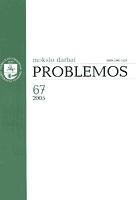APGLĖBIANTIS MĄSTYMO BŪDAS
THE EMBRACING MODE OF THINKING
Author(s): Viktorija Daujotytė-PakerienėSubject(s): Philosophy
Published by: Vilniaus Universiteto Leidykla
Keywords: method; theory; thought; philosophy; poetry; phenomenology
Summary/Abstract: The author sets out to reconsider the problem of humanistic methods. It expresses the doubt as to the application of the methods which are detached from theories and a more general mode of thought. The title of the article is taken from the Lithuanian edition of the preface to “Semiotics” (1989) written by A. J. Greimas. The mode of thought, embracing the multifarious worlds of meaning, is considered as a humanistic universal, it is also perceived as a bridge of thought to prevailing phenomenology. The concept of embrace encompasses the dimension of the body and the full mental participation of the individual. A brief review of the first translation of Edmund Husserl’s “Cartesian Meditations” into Lithuanian by Tomas Sodeika (2005) are presented. Meditation is viewed as the common ground-substratum shared by philosophy and poetry. “Meditations” (1997) of Donaldas Kajokas are introduced. Algis Mickûnas and Arûnas Sverdiolas’s dialogues “The All-Embracing Present” (2004) are referred to as a personal testimony of the inner participation in the theories. The significance of A. Ðliogeris’s study “Thing and Art“ (1988), which discusses the creative work of P. Cezanne and R. M. Rilke, is reflected within the framework of the tradition of phenomenological thought; here the concept of theoretical point of view was first formulated in Lithuanian humanistics. The article suggests that in approaching the problems of method in humanistics, and especially in literary criticism, the participation of creation itself is very important, and particularly the experiences that open up in original texts (like in the writings of Marcel Proust, Jorge Luis Borges). It is important to reveal the equivalents, to reflect them, to extract the method from the texts. The article arrives at the conclusion that the recognition of the organizing inner text system is the essential principle of humanistic methodology, which is in close connection with the embracing mode of thought.
Journal: Problemos
- Issue Year: 2006
- Issue No: 69
- Page Range: 47-61
- Page Count: 15
- Language: Lithuanian

